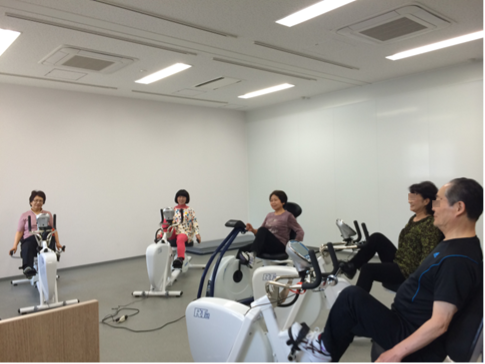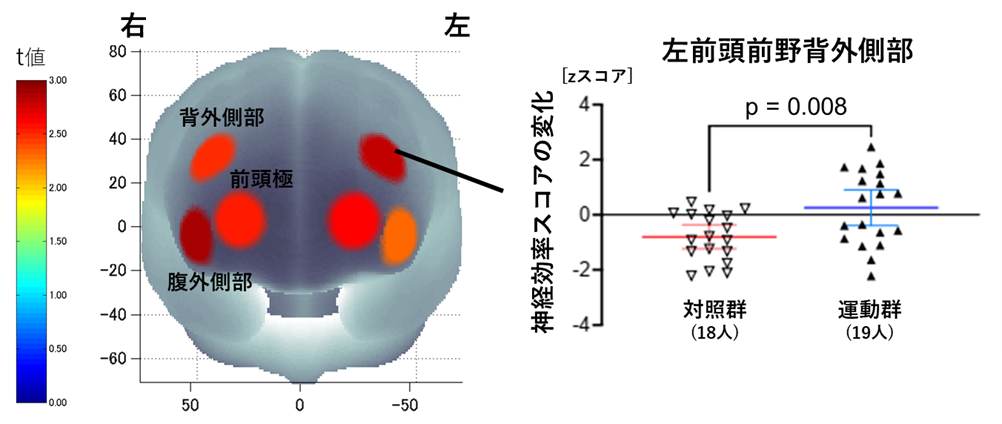【Press Release】A paper by Prof. Hideaki Soya and Prof. Yassa Michael A. et al. has been published in GeroScience (IF=7.6), the official journal of The American Aging Association.


A research article by ARIHHP professor Hideaki SOYA (Research field: Biochemistry of exercise, Neuroendocrinology, Neuroscience of exercise) and Michael A. YASSA (Research field: Sports Neuroscience) et al. was published in an international journal, GeroScience.
Stress-free mild exercise over a three-month period can significantly improve cognitive function in healthy middle-aged and older adults. Particularly among older individuals, the exercise regimen led to enhanced brain activity and efficiency in the prefrontal cortex, paving the way for the development of new strategies to enhance brain function through mild exercise.
Tsukuba, Japan—Maintaining and promoting cognitive function in older adults can be aided by regular exercise. While previous research has focused on the effects of moderate- to high-intensity aerobic exercise programs lasting anywhere from six months to a year on executive function–controlled by the prefrontal cortex—the challenge lies in motivating individuals to engage in and adhere to rigorous exercise routines.
Building upon prior investigations conducted by investigators at the University of Tsukuba and the University of California, Irvine, it has been observed that even brief sessions of mild exercise, such as walking and yoga, can stimulate the brain and yield temporary improvements in cognitive performance. However, until now, the impact of long-term mild aerobic exercise on brain function in humans, as well as the underlying mechanisms involved, remained unexplored.
For this study, a group of healthy middle-aged and older adults (aged 55-78) were randomly divided into two groups: one performed low-intensity bicycle exercise three times a week for three months (exercise group), while the other group continued their normal daily routine (control group). The research team evaluated the participants’ executive function using a Stroop test and assessed prefrontal cortex activity during the task using functional near-infrared spectroscopy before and after the intervention.
The findings revealed that the exercise group exhibited significant improvement in executive function compared to the control group. Notably, when analyzing the data by age, the benefits of mild exercise were particularly pronounced in the older adult group (aged 68-78). The underlying brain mechanism behind this improvement involved an increase in the efficient activation of the prefrontal cortex. In other words, executive function was high while corresponding brain activation was relatively low. These results suggest that even three months of mild exercise can strengthen the brain’s functional networks, enabling the prefrontal cortex to be utilized more efficiently during the Stroop test.
This groundbreaking discovery highlights the positive impact of stress-free mild exercise over a three-month period in strengthening the prefrontal cortex and enhancing cognitive function among older adults. The findings are expected to contribute to the development of new exercise programs and strategies that improve executive function and are easily accessible for older individuals with low physical fitness levels and limited motivation to exercise.
【Title】 Mild exercise improves executive function with increasing neural efficiency in the prefrontal cortex of older adults
【Authors】Kyeongho Byun, Kazuki Hyodo, Kazuya Suwabe, Takemune Fukuie, Min-seong Ha, Chorphaka Damronthai,
Ryuta Kuwamizu, Hikaru Koizumi, Michael A. Yassa, Hideaki Soya
【Journal】GeroScience
【DOI】 10.1007/s11357-023-00816-3
Press Release: Mild Exercise for Three Months Enhances Cognitive Function and Brain Efficiency in Older Adults
GeroScience

